Thư viện tài liệu, ebook tổng hợp lớn nhất Việt Nam
Website chia sẻ tài liệu, ebook tham khảo cho các bạn học sinh, sinh viên

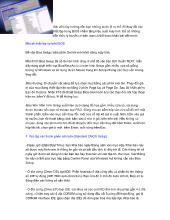 Vọc BIOS để tăng tốc phần cứng
Vọc BIOS để tăng tốc phần cứngDRAM/Memory Write Wait States: chọn 1WS khi hệ thống nhanh hay DRAM chậm (tốc độ 40MHz trở lên). Chọn 0WS khi hệ thống và DRAM có thể tương thích (33MHz trở xuống). -Hidden Refresh Option: để enable, CPU sẽ làm việc nhanh hơn do không phải chờ mỗi khi DRAM được làm tươi. - Slow Refresh Enable: Mục nầy nhằm bảo đảm an toàn dữ liệu trên DRAM,...
 4 trang | Chia sẻ: tlsuongmuoi | Ngày: 12/04/2013 | Lượt xem: 2228 | Lượt tải: 0
4 trang | Chia sẻ: tlsuongmuoi | Ngày: 12/04/2013 | Lượt xem: 2228 | Lượt tải: 0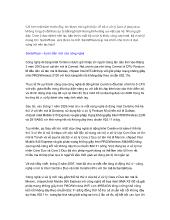 SantaRosa – Thêm một bước tiến mới về công nghệ
SantaRosa – Thêm một bước tiến mới về công nghệ5 lần so với các chuẩn kết nối không dây trước đây. Ngoài ra, công nghệ vi xử lý này còn được trang bị công nghệ Intel Dynamic Acceleration giúp nâng cao hiệu suất hoạt động của cả hệ thống và một công nghệ tùy chọn độc đáo là công nghệ bộ nhớ flash, Turbo Memory giúp rút ngắn thời gian khởi động của hệ thống và những ứng dụng sử dụng thường xuyên.
 3 trang | Chia sẻ: tlsuongmuoi | Ngày: 12/04/2013 | Lượt xem: 2102 | Lượt tải: 0
3 trang | Chia sẻ: tlsuongmuoi | Ngày: 12/04/2013 | Lượt xem: 2102 | Lượt tải: 0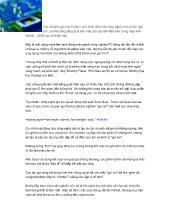 Gió Ion làm mát chip tới 250%
Gió Ion làm mát chip tới 250%Các công nghệ làm mát bằng quạt hiện nay có nhiều hạn chế, bởi chúng rất hay gặp phải sự cố liên quan đến luồng khí. Khi không khí xoay tròn phía trên bề mặt chip, phần khí gần con chip nhất có thể "bị kẹt" và đứng yên, vô hiệu hóa mọi nỗ lực làm mát. Tuy nhiên, công nghệ gió ion lại sử dụng một sách lược khác. Trước sự quan sát của các cử t...
 2 trang | Chia sẻ: tlsuongmuoi | Ngày: 12/04/2013 | Lượt xem: 2255 | Lượt tải: 0
2 trang | Chia sẻ: tlsuongmuoi | Ngày: 12/04/2013 | Lượt xem: 2255 | Lượt tải: 0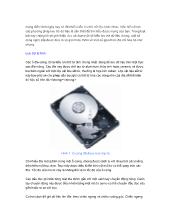 Bộ nhớ và lưu trữ - Phần 1
Bộ nhớ và lưu trữ - Phần 1Mạng điển hình ngày nay có rất nhiều kiểu lưu trữ dữ liệu khác nhau. Việc hiểu được các phương pháp lưu trữ dữ liệu là cần thiết để tìm hiểu được mạng của bạn. Trong loạt bài này chúng tôi sẽ giới thiệu cho các bạn một số kiểu lưu trữ dữ liệu chung, một số công nghệ sắp được đưa ra và giới thiệu thêm về một số giao thức địa chỉ hóa bộ nhớ chung.
 5 trang | Chia sẻ: tlsuongmuoi | Ngày: 12/04/2013 | Lượt xem: 2394 | Lượt tải: 0
5 trang | Chia sẻ: tlsuongmuoi | Ngày: 12/04/2013 | Lượt xem: 2394 | Lượt tải: 0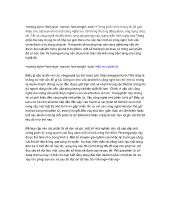 Bộ nhớ và lưu trữ - Phần 2: Các công nghệ lưu trữ mới
Bộ nhớ và lưu trữ - Phần 2: Các công nghệ lưu trữ mớiTrong phần một chúng tôi đã giới thiệu cho các bạn về một số công nghệ lưu trữ thông thường đang được ứng dụng rộng rãi. Tất cả công nghệ đó đều được ứng dụng trong các mạng điển hình ngày nay.Trong phần hai này chúng tôi sẽ tiếp tục giới thiệu cho các bạn một số công nghệ mới vẫn chưa được ứng dụng rộng rãi. Trong một số trường hợp các công nghệ n...
 4 trang | Chia sẻ: tlsuongmuoi | Ngày: 12/04/2013 | Lượt xem: 2347 | Lượt tải: 0
4 trang | Chia sẻ: tlsuongmuoi | Ngày: 12/04/2013 | Lượt xem: 2347 | Lượt tải: 0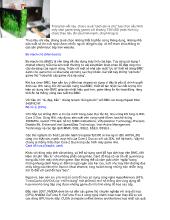 Tự ráp máy tính chơi game
Tự ráp máy tính chơi gameTrong bài viết này, chúng ta sẽ “xách giỏ ra chợ” lựa chọn cấu hình máy chơi game (máy game) với khoảng 730 USD (màn hình tùy chọn) theo tiêu chí cấu hình mạnh, chi phí hợp lý. Theo tiêu chí này, chúng ta sẽ chọn những thiết bị phần cứng thông dụng, những nhà sản xuất có tên tuổi hoặc được nhiều người dùng tin cậy, có thể tham khảo thông tin các...
 3 trang | Chia sẻ: tlsuongmuoi | Ngày: 11/04/2013 | Lượt xem: 2176 | Lượt tải: 0
3 trang | Chia sẻ: tlsuongmuoi | Ngày: 11/04/2013 | Lượt xem: 2176 | Lượt tải: 0 Tìm hiểu về cách làm việc của CPU - Phần II
Tìm hiểu về cách làm việc của CPU - Phần IICPU (Central Processing Unit) – cũng được gọi là microprocessor hay processor – là một đơn vị xử lý dữ liệu trung tâm. Tuy mỗi một bộ vi xử lý đều có thiết kế của riêng nhưng tất cả đều có cùng một nguyên lý chung – đây chính là thứ mà chúng tôi muốn giới thiệu đến các bạn trong bài này. Chúng tôi sẽ giới thiệu đến kiến trúc CPU chung nhất để các b...
 7 trang | Chia sẻ: tlsuongmuoi | Ngày: 11/04/2013 | Lượt xem: 2438 | Lượt tải: 1
7 trang | Chia sẻ: tlsuongmuoi | Ngày: 11/04/2013 | Lượt xem: 2438 | Lượt tải: 1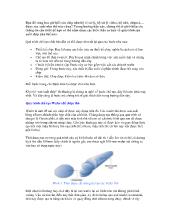 Chip máy tính được sản xuất như thế nào
Chip máy tính được sản xuất như thế nàoBạn đã từng bao giờ biết các chip như bộ vi xử lý, bộ xử lý video, bộ nhớ, chipset, được sản xuất như thế nào chưa? Trong hướng dẫn này, chúng tôi sẽ giới thiệu các thông tin cần thiết để bạn có thể nắm được các kiến thức cơ bản về quá trình sản xuất chip như thế nào.
 5 trang | Chia sẻ: tlsuongmuoi | Ngày: 11/04/2013 | Lượt xem: 2318 | Lượt tải: 0
5 trang | Chia sẻ: tlsuongmuoi | Ngày: 11/04/2013 | Lượt xem: 2318 | Lượt tải: 0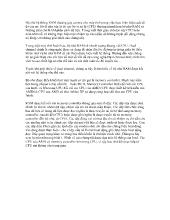 Giới thiệu về Dual Channel - Phần 1
Giới thiệu về Dual Channel - Phần 1Bộ nhớ hệ thống RAM thường gây cản trở cho máy tính trong việc thực hiện hiệu suất tối đa của nó. Sở dĩ như vậy là do các bộ vi xử lý (CPU) thường nhanh hơn bộ nhớ RAM và thường phải chờ RAM phân phối dữ liệu. Trong suốt thời gian chờ đợi này CPU hoàn toàn nhàn rỗi và không thực hiện một nhiệm vụ nào (điều đó không tuyệt đối đúng nhưng nó khớp với ...
 4 trang | Chia sẻ: tlsuongmuoi | Ngày: 11/04/2013 | Lượt xem: 2350 | Lượt tải: 0
4 trang | Chia sẻ: tlsuongmuoi | Ngày: 11/04/2013 | Lượt xem: 2350 | Lượt tải: 0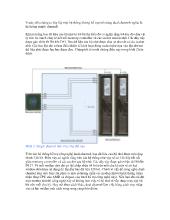 Giới thiệu về Dual Channel - Phần 2
Giới thiệu về Dual Channel - Phần 2Trước tiên chúng ta hãy lấy một hệ thống không hỗ trợ tính năng dual channel (nghĩa là hệ thống single channel). Khi nói rằng bus dữ liệu của bộ nhớ là 64-bit thì điều đó có nghĩa rằng 64 dây đó (dây vật lý trên bo mạch chủ) sẽ kết nối memory controller và các socket của bộ nhớ. Các dây này được gán nhãn từ D0 đến D63. Bus dữ liệu của bộ nhớ được c...
 7 trang | Chia sẻ: tlsuongmuoi | Ngày: 11/04/2013 | Lượt xem: 2231 | Lượt tải: 0
7 trang | Chia sẻ: tlsuongmuoi | Ngày: 11/04/2013 | Lượt xem: 2231 | Lượt tải: 0

